- Home
- Andrew McGahan
The War of the Four Isles
The War of the Four Isles Read online
PRAISE FOR SHIP KINGS
‘McGahan continues what is turning into an authoritative act of world-building, in prose much more chiselled than that usually found in this kind of fantasy.’
Sydney Morning Herald
‘This is a richly imagined world of creaking timbers, tall masts and muscled sailors amid the complex social order of a ship of 600 men. McGahan’s lyrical prose makes you feel the sway of hammock and hear the sea thumping against the hull.’
Australian Book Review
‘A rollicking and exhilarating sea adventure, the book feels like an ode to the greats like Robert Louis Stevenson and Herman Melville; it’s a remarkable new series, and both children and young adults will find themselves pulled into the swelling story.’
AlphaReader.com.au
‘An exhilarating read. McGahan lets his adventure build gently and a detailed, evocative coming-of-age story unfolds.’
Saturday Age
‘This beautifully crafted novel shapes up as a classic seafaring tale. In Dow, we have the makings of a classic hero.’
Herald Sun
‘McGahan captures the mystery and romance of the sea, and draws us in with his fine portrayal of his restless lead.’
Australian Bookseller + Publisher
‘McGahan has produced a memorable start to his trilogy, peopled with characters who stay in the mind . . . One can only hope that it will not be long before the next episode of Dow’s life takes place.’
Magpies
‘Masterful storytelling, elegant prose and a powerful sense of place . . . the kind of storytelling that stays with you long after the tale has ended.’
Viewpoint
SHIP KINGS
THE COMING OF THE WHIRLPOOL
THE VOYAGE OF THE UNQUIET ICE
THE WAR OF THE FOUR ISLES
To follow:
THE OCEAN OF THE DEAD
This project has been assisted by the Australian Government through the Australia Council, its arts funding and advisory body.
First published in 2014
Copyright © Andrew McGahan, 2014
All rights reserved. No part of this book may be reproduced or transmitted in any form or by any means, electronic or mechanical, including photocopying, recording or by any information storage and retrieval system, without prior permission in writing from the publisher. The Australian Copyright Act 1968 (the Act) allows a maximum of one chapter or ten per cent of this book, whichever is the greater, to be photocopied by any educational institution for its educational purposes provided that the educational institution (or body that administers it) has given a remuneration notice to the Copyright Agency (Australia) under the Act.
Allen & Unwin
83 Alexander Street
Crows Nest NSW 2065
Australia
Phone: (61 2) 8425 0100
Email: [email protected]
Web: www.allenandunwin.com
A Cataloguing-in-Publication entry is available from the National Library of Australia
www.trove.nla.gov.au
ISBN 978 1 74331 509 5
eISBN 978 1 74343 283 9
Cover and text design by Liz Seymour
Cover, map and internal illustrations by Ritva Voutila
BATTLE REPORTS
The War of the Four Isles – so called to set it apart from the Great War of eight decades earlier – was a complex and many-faceted affair, not easily summarised. But as this tale will not join the war until the third year of the fighting, some account of the intervening years is required – and there being not the time nor space here to give that account in full, the merest summary must indeed suffice, and now follows.
As students of history will of course recall, the war began with the assault by an unknown fleet upon the Ship Kings’ capital vessel, the Twelfth Kingdom, resulting in the sinking of the mighty craft, and the death of Ibanez the Third, Sea Lord. (There are those who argue the war actually began six months earlier, with the raids by stealth on the New Island cities of Stone Port and Lonsmouth; but that is a debate for the scholars.)
The Ship Kings’ outrage at this attack was matched only by their bafflement, for the mysterious enemy fleet, some sixty ships strong, turned out to hail from the Twin Islands of Red and Whale, lands that the Ship Kings had ruled for generations. Worse news followed: namely that in the Twin Isles themselves the population had risen up and overthrown their appointed governor, and that a second fleet, as big as the first, now stood guard there.
A hundred and twenty ships! How had the Twin Islanders – a subject, beaten people – amassed such an armada? Where had they built it? Construction would require shipyards, and vast supplies of timber and iron, and thousands of craftsmen, and then a town to house the craftsmen . . . but there was no such place in the Twin Isles. So where was it all hidden?
Ship Kings interrogators soon put this very question – forcibly – to Twin Islander prisoners captured in the battle. But the answers the prisoners gave were infuriating. Oh, they revealed the location of the hidden shipyards readily enough, but knowledge of that location was in fact of little use to the Ship Kings – for it was a place they could not go!
Nevertheless, awake at last to the threat to their empire, the Ship Kings knew they must strike back – and their response was formidable. Within a week of the Twelfth Kingdom’s destruction, they had assembled and dispatched an armada of some ninety warships, two thirds of their entire armed fleet, to the Twin Isles, there to crush the rebellion.
So rapidly did this armada make the crossing of the Middle Sea, it outpaced the Twin Islands fleet itself sailing home from the battle, and hence arrived without warning, catching the Twin Islanders’ second fleet unready. The Ship Kings were also better prepared now to deal with the Twin Islanders’ deadly attack boats, having fitted their battleships with light, fast-aiming cannon that could track the self-propelled craft, and sweep them with grapeshot.
The resulting battle, the second great and bloody clash of the war, was a victory to the Ship Kings. Albeit, they had little choice afterwards but to withdraw to their home waters, for they had not regained control of any Twin Islands ports; but the point had been made. They were not beaten in this war, and the Twin Islanders’ new weapons were not in themselves a guarantee of victory.
It was by then the end of summer, and both sides used the following autumn and winter to rearm – and to reconsider strategies. This would not, everyone now recognised, be a quick war. And if the struggle was to be prolonged, then control of supplies like timber and food would be vital; in particular, control of New Island, with its forests and fertile farmlands. Thus, when spring came, fleets from both sides set sail for New Island, to battle for its possession.
Initially, the Twin Islanders gained the upper hand. In a series of engagements off New Island’s west coast, the Ship Kings were severely defeated and compelled to fall back to the Kingdoms. The Twin Islanders triumphantly declared New Island liberated from foreign rule; but the reality was that in many towns the Ship Kings garrisons still held out in their fortified compounds – most notably in Stone Port, where the great fortress underwent a six-month siege before finally falling in ruin.
Still, inspired by their victories, the Twin Islanders now sent a fleet eighty ships strong to attack Great Island itself – for surely the Ship Kings, deprived of timber for their shipyards, could no longer resist. But the Ship Kings, by converting most of their merchantman fleet to warships, had made good their spring losses. Furthermore, during unseasonal storms, the Twin Islands fleet became dangerously dispersed on the voyage across, and the Ship Kings, the more disciplined sailors, were able to trap and defeat the fragmented Twin Islanders in detail.
>
So comprehensive was this Ship Kings victory, by next spring – the third of the war – they had been able to regain most of their lost territory on New Island. The Twin Islanders were pushed back to only two ports on the west coast, and for a season the Ship Kings could once again fill their starved shipyards with precious highland timber.
But as spring wore into summer the Twin Islanders received heavy reinforcements from their own yards – secure as ever beyond the Ship Kings’ reach – and began to push forward again, regaining port after port by blockade. Their armies also advanced overland, and after hard fighting took control of the Long River, New Island’s lifeblood. By autumn, the timber supply routes had once more been closed to the Ship Kings, and the fortunes of war were swinging slowly back in the Twin Isles’ favour.
But would it prove a decisive advantage? The unpalatable truth was this: despite all the engagements that had been so far fought, despite the scores of ships sunk and the thousands of sailors lost, neither side could yet be sure of a final victory. All that could be done was to withdraw and repair the fleets over winter, in readiness for yet another year of battle.
The fourth of the war.
*
That same grim autumn marked Dow Amber’s nineteenth birthday.
Three years had passed since he’d sailed from his homeland, and he was a youth no longer, even if he remained, as he ever would, of slight build and short stature. Nor was he a green hand anymore. He was a seaman fully able now; in fact, he was an officer in service with the Twin Islands fleet.
His fame too had grown; he was now not only the boy who had ridden the maelstrom, and the youth who had breached the Ice Wall and beheld the very Pole, and who had twice defied and escaped the Ship Kings. Now it was also known far and wide that he was the sole heir of the renowned Admiral Honous Tombs, captain of the Grey Sail, and nemesis of the Ship Kings in the Great War.
Indeed, to the Twin Islanders he had become known, admiringly if inaccurately, as the Young Admiral. But to the Ship Kings – enraged to learn that they had twice held and let escape the heir of their great enemy – he was now doubly a rebel and a murderer. In his honour thus, in the first winter of the war, they had announced a bounty of a thousand gold pieces upon his head, which was higher than the price offered on the Twin Islands high commanders, even on the War Master himself.
And yet for all this fame and notoriety, Dow had actually played no major part in the war. To his frustration and shame, he had not even yet fought in a major battle. For reasons of their own, the Twin Islanders had instead posted him far away from the serious fighting. He had spent most of the conflict to date serving on an unheralded battleship named the Snout, which was assigned merely to patrol duty in the home waters about the Twin Isles.
And far from being a young admiral, Dow was in truth only a junior lieutenant, newly commissioned. He had begun his service on the Snout as a common seaman, and it had taken a further two years of study to be accepted into the officer ranks. It is a strange fact of history to note that at no stage in the war would he be promoted beyond this lowly position.
Ah, but there is more to the nature of authority than a title. As this volume – the third in the saga of Dow’s extraordinary life – will soon relate, the time was nigh when even as a mere lieutenant he would shake the war to its very foundations, and even without official rank, ascend to the highest command.
It all started that same autumn. And as is so often the case with the turning points of history, the beginning was a seemingly minor incident; a chance encounter between the Snout and a Ship Kings patrol. It was Dow’s first fight in charge of others, and it would not begin well – before becoming worse. Still, at the time it hardly appeared an event that would be remembered by scholars.
Only later would the incident’s true importance emerge; that of setting Dow on the final path fate had long been preparing for him . . .
1. AN UNSPEAKABLE RESCUE
Lieutenant Dow Amber – famed Young Admiral, scourge of the Ship Kings – peered determinedly at the children’s book in front of him.
‘The . . . little . . . fish . . .’ he read laboriously, sweating in the heat, ‘. . . is eaten . . . by the . . . big fish. The big fish is . . . eaten by the . . . big . . .’
‘Bigger,’ came the correction from across the desk. ‘The big fish is eaten by the bigger fish.’
Dow wiped his brow and nodded. ‘The . . . bigger fish . . . is eaten by the . . . shark . . . and the shark is eaten by the . . . whale.’ He frowned to himself, knowing full well that whales didn’t eat sharks – but then this was a book for learning to read, not for learning facts. ‘And the whale,’ he struggled on, ‘is eaten by the . . . mon . . . the monster . . . of the . . . deep.’
‘Perfect!’ applauded his tutor.
Dow heaved a sigh and slumped back in his chair. Glancing at the hourglass he saw that it was almost run through. Thank all the oceans! Reading was hard work at the best of times; in this heat, an hour straight of it was exhausting.
Cassandra had noted the glass too; she gathered up the book – A Child’s Reading Primer it was titled, rather humiliatingly for Dow – and riffled through the final pages before shutting it. ‘We’re nearly done, you know. There’s only a dozen exercises left. A few more lessons should do it.’ She gave an arch smile. ‘Then we can move on to a real book!’
Dow only shook his head, rubbing at his stiffened neck and shoulders. Enough of books! What he should really do now was get below to his cabin and snatch some sleep; he was due back on duty in a few hours. But he didn’t move, lethargy holding him in his chair. It was too hot to sleep anyway.
He squinted at the day outside. The lesson, as usual, had taken place in the Snout’s Great Cabin, at a desk situated by the windows for better light. The shutters had all been thrown open in the hope of a breeze, but beyond them the noon sky was glaring and fierce, and the air all but still. The sea too was torpid, stretching away glassy flat and murky green. Haze hid the horizon, so thick it was like smoke from a forest fire, though there was no smell of burning, only a stale seaweed tang from the water.
For three days now it had been like this; stifling, and the ship virtually becalmed, aside from the occasional parched breath of wind, barely enough to stir the sails. Why, it was almost as if the Snout had strayed into the Barrier Doldrums.
Cassandra had risen to stretch her back, her bare arms raised, sweat gleaming on her freckled skin. ‘Not that we actually have many other books on this fate-forsaken ship. I can’t tell you how much I miss the library back home. Even before the war we had over a thousand volumes, pilfered from the Ship Kings – and we were writing our own, too!’
Dow regarded her listlessly a moment, reminded as he often was of how different Cassandra’s youth had been to his own. His tutor was only a year older than he was, but she – born and raised in the Twin Islands’ secret shipyards – had been reading since she was a child; not to mention her training in all the other arts at which a laundress was expected to be proficient. Among them, if rumour was true, the manufacture of potions and poisons!
‘It’s not my fault you’re stuck here,’ he said, yawning. ‘All you have to do is convince your mistresses to transfer me to the battle fleets, then we could both get off this ship.’
She only rolled her eyes at him; it was, after all, an old argument. Plucking in frustration at her bird’s nest of tresses, she abruptly declared, ‘I’m going to wash my hair. In fresh water, too. I’ll commandeer a barrel. This heat is ridiculous.’
Dow snorted. There was no possibility of her obtaining fresh water just to wash her hair, laundress or not. But the heat was indeed ridiculous. Summer was gone. It should be getting cooler. But then seasons meant little, this far south.
He gazed out the window again, pondering the Doldrums once more. By the charts, the dreaded Barrier zone was in fact still several hundred miles to the south. Nevertheless, perhaps some portion of the Doldrums’ noxious atmosphere had drifted north
wards, bringing with it the haze and seaweed smell that were holding the ship captive.
At least they’d be turning around soon. At sea for three weeks now, they were nearing the end of their outward leg; their destination, only a few days sail to the south, was an uninhabited rock known as Last Isle, a hump that stood as nigh to the Doldrums as any ship dared to go. There they would come about and set a course back to Red Island.
Just as they’d done over and over again – eternally it seemed to everyone on board – throughout these last two and half years of war.
Oh, it was important enough duty. The stretch of ocean they patrolled was known as the Southern Reach, and it formed the only practical route by which a hostile fleet might approach the Twin Islanders’ secret shipyards. It had to be monitored ceaselessly for sign of the enemy; the Snout and its two companion ships made up just one of several flotillas that were committed to the vital task.
Sometimes there was even fighting; engagements with Ship Kings patrols testing the Reach’s defences. The Snout was not a total stranger to cannon fire and bloodshed. But they were minor skirmishes at best. And rare. For the most part patrol duty was dull, repetitive and slow.
And in the far south, hot.
Even after all this time, Dow was still not used to it. The rest of the crew were Twin Islanders, reared in the heat of the tropics, and even they suffered when conditions were at their most blistering – but Dow was a New Islander, raised to the ice and snow of the highlands. It was worse for him. It was nearly two months, for instance, since he had been promoted to lieutenant, and yet he had not once donned his new officer’s coat on duty – it lay rolled up permanently in his sea chest down in his cabin.
Indeed, at moments like this, even a shirt was too much; Dow’s was plastered to his chest with sweat. He would have gone shirtless entirely, as most of the crew had these last few days, but even though discipline was more lax on a Twin Isles vessel compared to a Ship Kings craft, it still wasn’t done for an officer to go half naked.

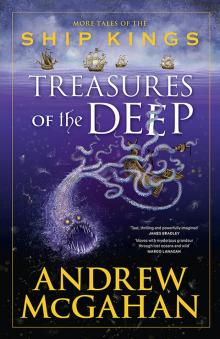 Treasures of the Deep
Treasures of the Deep The Rich Man’s House
The Rich Man’s House Praise
Praise The White Earth
The White Earth 1988
1988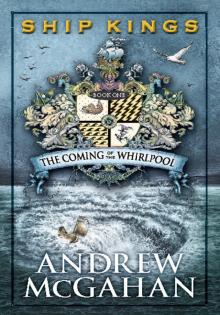 The Coming of the Whirlpool
The Coming of the Whirlpool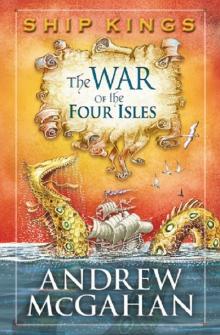 The War of the Four Isles
The War of the Four Isles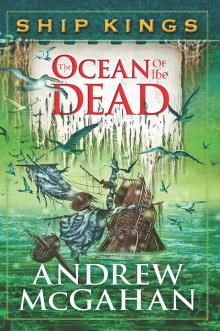 The Ocean of the Dead: Ship Kings 4
The Ocean of the Dead: Ship Kings 4 Last Drinks
Last Drinks Wonders of a Godless World
Wonders of a Godless World Underground
Underground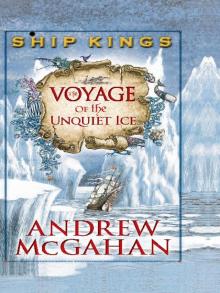 The Voyage of the Unquiet Ice
The Voyage of the Unquiet Ice